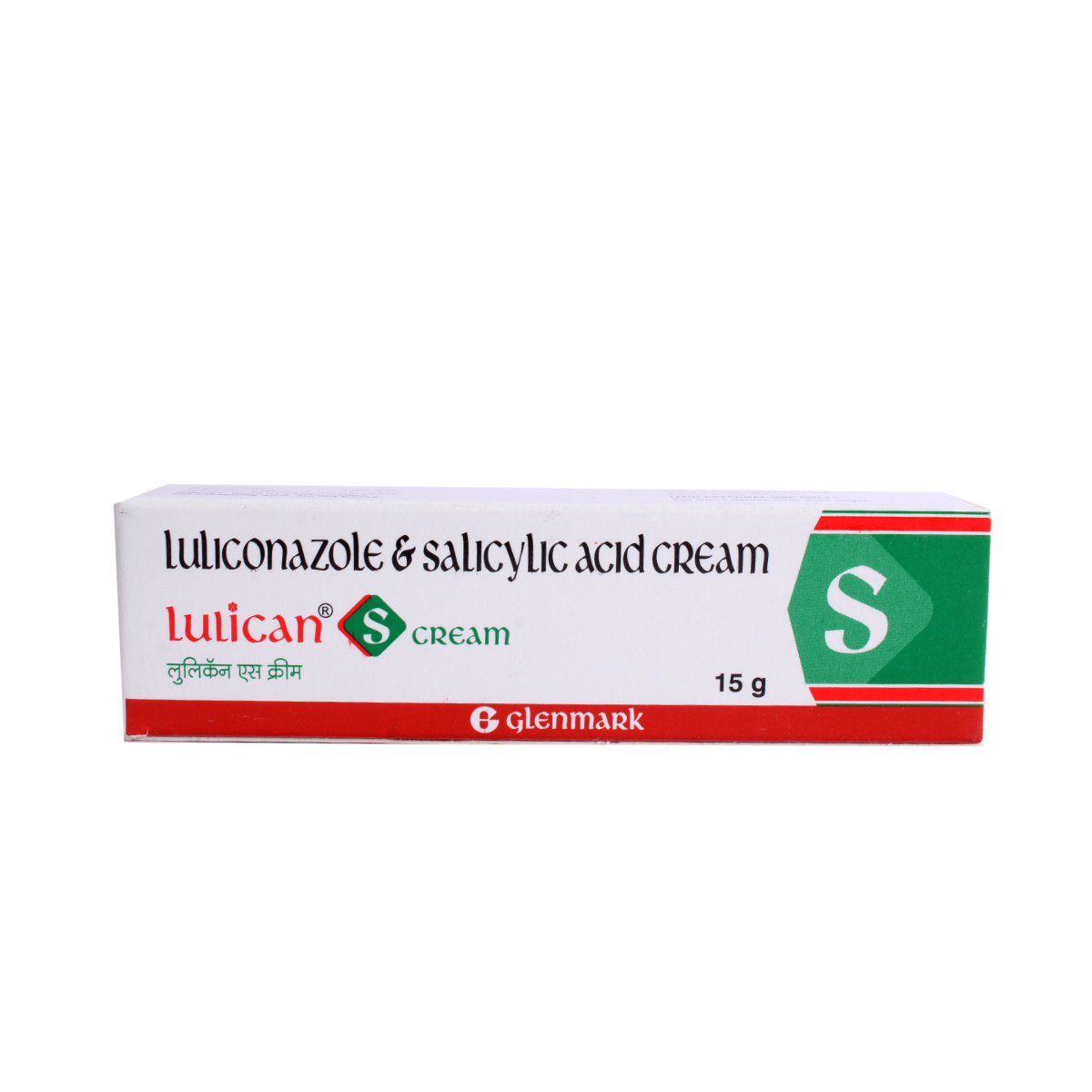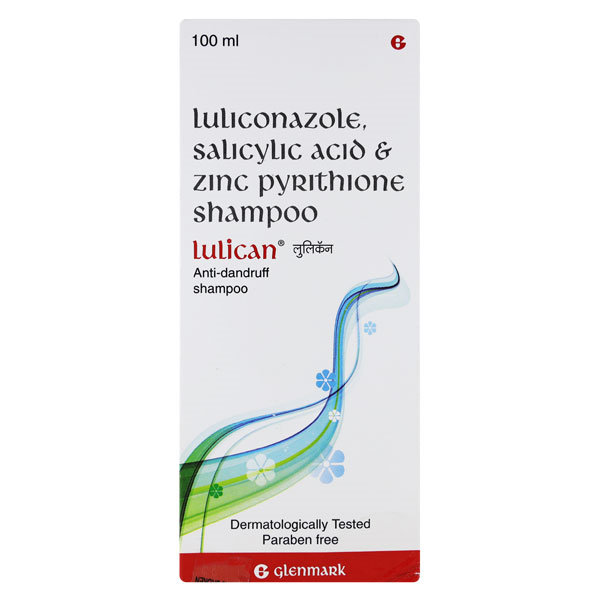Luliconazole+salicylic Acid
About Luliconazole+salicylic Acid
Luliconazole+salicylic Acid belongs to a class of drugs called antifungals. It primarily treats fungal skin infections, including ringworm, jock itch, and athlete’s foot. Fungal infection is a skin disease in which a fungus attacks the tissue and causes infection. Fungal infections may be contagious (spread from one person to another).
Luliconazole+salicylic Acid is a combination of two medications: Luliconazole and salicylic acid. Luliconazole has a broad spectrum of antifungal activity. The enzyme lanosterol demethylase is thought to be inhibited by Luliconazole. Lanosterol demethylase is required to synthesise ergosterol, a key component of fungal cell membranes. Salicylic acid is a keratolytic agent that removes dead skin cells and softens skin by breaking down the protein keratin (a part of the skin structure). As a result, Luliconazole+salicylic Acid kills the fungi and clears the infection.
Luliconazole+salicylic Acid is only for external use. Some people may experience application site reactions such as redness, swelling, irritation, or burning skin sensation at the site. Most of these side effects of Luliconazole+salicylic Acid do not require medical attention and gradually resolve over time. However, if the side effects persist or worsen, please consult your doctor.
It is recommended not to use Luliconazole+salicylic Acid if you are allergic to any components present in it. If you are pregnant or a nursing mother, it is advised to consult a doctor before using Luliconazole+salicylic Acid. Luliconazole+salicylic Acid is not recommended for children until your doctor recommends it. Let your doctor know about your medical history and other medications you are currently taking to rule out any potential negative effects.
Uses of Luliconazole+salicylic Acid
Medicinal Benefits
Luliconazole+salicylic Acid is an antifungal medication primarily used to treat fungal skin infections, such as ringworm, jock itch and athlete’s foot. Luliconazole+salicylic Acid is a combination of two medications: Luliconazole and salicylic acid. Luliconazole has a broad spectrum of antifungal activity. The enzyme lanosterol demethylase is thought to be inhibited by Luliconazole. Lanosterol demethylase is required to synthesise ergosterol, a key component of fungal cell membranes. Salicylic acid is a keratolytic agent that removes dead skin cells and softens skin by breaking down the protein keratin (a part of the skin structure). Thereby, It helps to clear fungal infections and provides relief from cracking, burning, scaling, and itching of the skin caused due to conditions.
Directions for Use
Storage
Side Effects of Luliconazole+salicylic Acid
Application site reactions (Redness, swelling, irritation or burning sensation)
Drug Warnings
It is strictly recommended not to use Luliconazole+salicylic Acid if you are allergic to any components present in it. If you are pregnant or a nursing mother, it is advised to consult a doctor before using this medicine. Luliconazole+salicylic Acid is not recommended for children until your doctor recommends it. Before taking Luliconazole+salicylic Acid, inform your doctor about your medical history and other medications you are currently taking to rule out any potential negative effects. Avoid contact of Luliconazole+salicylic Acid with nose, mouth, or eyes as it may irritate. If Luliconazole+salicylic Acid accidentally comes into contact with these areas, rinse with water thoroughly.
Drug Interactions
Drug-Drug Interactions: No interactions found.
Drug-Food Interactions: No interactions found.
Drug-Disease Interactions: No interactions found.
Drug-Drug Interactions Checker List:
Safety Advice

Alcohol
cautionNo interaction was found. However, it is advisable to avoid or limit alcohol consumption as a precautionary measure.

Pregnancy
consult your doctorPlease consult your doctor. There are no adequate and well-controlled studies on pregnant women. Your doctor will prescribe only if the benefits outweigh the risks.

Breast Feeding
consult your doctorIt is unknown whether Luliconazole+salicylic Acid is excreted in human milk. Please consult your doctor before using Luliconazole+salicylic Acid while breastfeeding. Your doctor will prescribe only if the benefits outweigh the risks.

Driving
not applicableLuliconazole+salicylic Acid does not affect your ability to drive.

Liver
consult your doctorLimited information is available on the use of Luliconazole+salicylic Acid in patients with liver disease. Inform your doctor if you have liver problems before taking this medicine. Your doctor will prescribe only if the benefits outweigh the risks.

Kidney
consult your doctorLimited information is available on the use of Luliconazole+salicylic Acid in patients with kidney disease. Inform your doctor if you have kidney problems before taking this medicine. Your doctor will prescribe only if the benefits outweigh the risks.

Children
consult your doctorLimited data is available on the use of Luliconazole+salicylic Acid in children. Please consult your doctor if you have concerns.
Habit Forming
Diet & Lifestyle Advise
- Regularly change your socks and wash your feet. Avoid shoes that make your feet sweaty and hot.
- Don't walk barefoot in wet places such as changing rooms and gym showers to prevent fungal infections.
- Do not scratch the affected skin; it can spread the infection to other body parts.
- Avoid sharing towels, combs, bedsheets, shoes, or socks with others.
- Wash your bed sheets and towels regularly.
Special Advise
- Before applying Luliconazole+salicylic Acid, clean and dry the affected area.
- Avoid contact of Luliconazole+salicylic Acid with nose, mouth or eyes. In case Luliconazole+salicylic Acid comes in contact with these areas accidentally, rinse with water thoroughly.
Patients Concern
Disease/Condition Glossary
Fungal infection: It is a skin disease in which a fungus attacks the tissue and causes infection. Fungal infections may be contagious (spread from one person to another). Ringworm is a common fungal infection of the skin or scalp that is contagious and causes a rash resembling a worm in a ring shape. Jock itch (also known as tinea cruris) is a fungal infection of the skin that causes an itchy, red rash in warm and moist areas of the body, such as the groin, buttocks, and inner thighs. An Athlete’s foot (also known as tinea pedis) is a fungal infection that usually starts between the toes, especially in people with extremely sweaty feet and tight-fitting shoes. It occurs most commonly in athletes. It causes itching, burning, or stinging sensation due to a scaly rash.
FAQs
Luliconazole+salicylic Acid is a combination of two medications: Luliconazole and salicylic acid. Luliconazole has a broad spectrum of antifungal activity. Salicylic acid is a keratolytic agent that removes dead skin cells and softens skin by breaking down the protein keratin (a part of the skin structure). Thereby clearing the fungal infection.
Yes, fungal infection is a contagious skin condition which spreads from one person to another through direct skin-to-skin contact or by contact with contaminated soil or surfaces and infected animals. Therefore, avoiding close direct contact until the infection is clear and avoiding sharing things with the infected person is recommended, as it can also spread the infection.
Do not use Luliconazole+salicylic Acid without a doctor's prescription.
You are recommended to use Luliconazole+salicylic Acid for as long as your doctor has prescribed it. However, if the condition worsens or persists after 1 to 2 weeks of treatment with Luliconazole+salicylic Acid, please consult a doctor.
You are not recommended to stop using Luliconazole+salicylic Acid without consulting your doctor, as it may cause recurring infections. Therefore, use Luliconazole+salicylic Acid for as long as your doctor has prescribed it, and if you experience any difficulty while taking Luliconazole+salicylic Acid, please consult your doctor.






